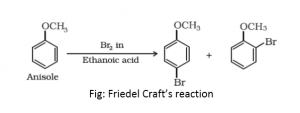Ether is an important topic included in the JEE syllabus for organic chemistry. Questions based on their reactions and methods of preparation are asked almost every year in JEE.
Important Questions For Ethers
Some FAQs related to ethers are discussed below:
Question: What is ether?
Answer: Ethers are the organic compounds containing an oxygen atom bonded to two same or different alkyl or aryl groups. The general formula for ethers can be R-O-R, R-O-Ar or Ar-O-Ar, where R represents an alkyl group and Ar represents an aryl group. They are generally classified into two categories on the basis of attached substituent group: symmetrical ethers (when two identical groups are attached to either side of the oxygen atom) and asymmetrical ethers (when two different groups are attached to either side of the oxygen atom).
Questions: What are the general methods of preparation of ethers?
Answer: Ethers can be prepared from other organic compounds by numerous methods. Some of them are underlined below:
- Dehydration of alcohols: In the presence of sulphuric acid, dehydration of ethanol yields ethoxyethane at 413 K. This is an ideal method of preparation through primary alcohols. Preparation of ethers by dehydration of an alcohol is a nucleophilic substitution reaction.

- Williamson’s synthesis: When an alkyl halide reacts with sodium alkoxide, ether is formed. This reaction is known as Williamson’s synthesis. The reaction generally follows the SN2 mechanism for primary alcohols.
Question: What are some of the important reactions of ether?
Answer: Ethers generally undergo chemical reactions in two ways:
- Cleavage of C-O bond: Ethers are generally very unreactive in nature. When an excess of hydrogen halide is added to an ether, cleavage of C-O bond takes place leading to the formation of alkyl halides. The order of reactivity is given as HI > HBr > HCl.
R−O−R + HX → RX + R−OH
- Electrophilic substitution: The alkoxy group in ether activates the aromatic ring at ortho and para positions for electrophilic substitution. Common electrophilic substitution reactions are halogenation, Friedel Craft’s reaction, etc.

Questions: Which reference books can one follow for ethers?
Answer: While covering ethers for JEE, one must go through the NCERT class 12th chemistry textbook part-2. A brisk walk through this chapter from NCERT not only gives you a sound idea of the various topics you need to cover but also develops the fundamentals regarding the chapter. Apart from this, you can follow a reference book to understand the mechanisms of the reactions not given in the NCERT textbook. Some authentic books for understanding the mechanism of organic reactions include books from authors like Solomons & Fryhle, Morrison & Boyd. Once you have developed concepts on this topic, you can practice questions from the books of authors like M. S. Chauhan, etc.
For further details related to ethers for JEE chemistry, get in touch with our mentors here at BYJU’S.

Comments